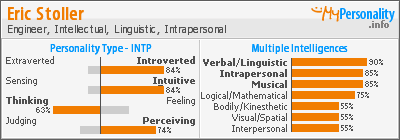You have /5 articles left.
Sign up for a free account or log in.
What do Mary-Kate Olsen (Ashley too), Albert Einstein, Socrates, Abraham Lincoln and I have in common? We're all introverts as classified by the Myers Briggs personality type indicator (MBTI). According to the MBTI, introversion is a psychological preference that focuses on how an individual both expends and recharges their energy. Often mislabeled as being related to "shyness or reclusiveness," introversion doesn't necessarily dictate social behavior. There are shy extroverts and uber-social introverts. The major difference between extroverts and introverts is that extroverts tend to recharge during social situations while introverts do not. Introverts generally recharge by themselves and tend to be seen as being "reflective or reserved."
As an introverted individual, I am often seen as being an extrovert due to the work that I do. Most of the time, people see me giving a keynote on stage or working with groups in a consultant capacity. In short, I do a lot of public speaking…and while I love what I do, I can say without a doubt that I deplete my introverted batteries on almost a daily basis. You see, being a professional speaker doesn't require that someone be a raging extrovert. You just have to make sure that you're recharging your energy whenever you get a chance. Whether I'm giving a talk in front of 500 people or 50, I'm expending more energy than I'm taking in. The rush that comes from speaking usually delivers at least 60 to 90 minutes of energy. And if that isn't enough, there's always the added boost that comes from coffee (or sugar free Red Bull). The energy of a crowd that is attentive, laughs at your (bad) jokes, and asks a lot of questions helps too. However, and this is my way of being proactive about my own introverted batteries, I am very protective of my time both before and after I give a talk. A full-day consulting/presenting schedule is a bit trickier. I'll get to that in a second. When I'm slated to give a keynote, I almost always stay in my hotel room or somewhere by myself until about an hour or so before my talk. That way, I am conserving my "social juice." After a talk, I am usually pretty "jazzed" for about an hour or so after it concludes. But, then you hit the wall. You know, when the adrenaline or "speaker's rush" has vanished, when you realize that you're coasting on introverted vapor. If I can, I will spend a couple of hours by myself as a way of recharging. I might check Twitter and respond to mentions, but that's more of a "social media woo" activity (See StrengthsQuest). A couple of hours of "me time" is usually all that's needed for a quick recharge. When I'm doing a full day of consulting/presenting, the only thing that helps with energy depletion is getting enough rest the night before and being in tune with myself. If I start to get tired, I generally ask the group for a 5 to 10 minute break. Those breaks make a big difference in an 8 hour consulting day.
If you take the MBTI and your personality is weighted heavily towards introversion, that's okay. You can still go up on stage and be a professional speaker. You can still be a consultant. Being reflective helps with putting your thoughts together. It helps with speaking. Now, let's say that you're a little shy, that's okay too. Here's a post that I wrote a while back where I share how I got into speaking…let's just say that my motivations weren't what you would expect.
There have been a lot of posts in the blogosphere on introverts and introversion. One of my favorites was from Andrew Careaga, a self-identified "raging introvert," on "Introverts and the 'new groupthink'." Another great read that I found on Careaga's blog was a link to a post on "Why Introverts Can Make The Best Leaders."
Do you tweet? Let's connect. Follow me on Twitter.





